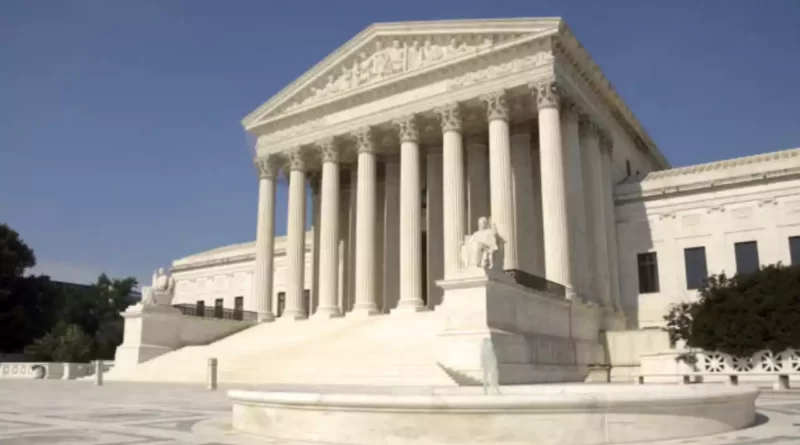The couple is fighting $15,000 in taxes. Washington may lose trillions on their case.
WASHINGTON — It began as a fight over $14,729 in taxes that the government said Charles and Kathleen Moore owed on an investment they made in a company in India.

But his case, which the Supreme Court will hear on Tuesday, could cost the government billions, following a wide-ranging challenge to federal tax cuts and some Democrats’ tax cuts on the super-rich. Proposals for planting have been advanced over the years.
The legal question in the case is how to define income for tax purposes. Washington…
However, the Supreme Court’s decision could have major implications for how much the government can increase the earnings of wealthy Americans who can shield those holdings from taxes.
The Moores, a retired couple who live in Washington state, make their case in simple terms: They never saw a return on their investment. Those profits were instead reinvested in the company, Kisan Craft, which sells farm equTax cases often make it to the Supreme Court without much fanfare. But Moore’s suit has drawn considerable attention for its potential to destabilize the tax system.
The case has also become part of the ongoing controversy over the ethics of the Supreme Court. And it has raised questions about whether groups filing appeals in the High Court are truthfully presenting all the facts. Washington…
ipment in India. Because they never “realized” this income, the Moores claim they cannot be taxed.
“If you have not received any income, how can you be required to pay income tax?” Charles Moore asks in a video posted by the Competitive Enterprise Institute, a libertarian group representing the Moores. “It seemed unconstitutional to both of us.”
Tax cases often make it to the Supreme Court without much fanfare. But Moore’s suit has drawn considerable attention for its potential to destabilize the tax system.
The case has also become part of the ongoing controversy over the ethics of the Supreme Court. And it has raised questions about whether groups filing appeals in the High Court are truthfully presenting all the facts.
A narrow ruling for Moores could cost the government billions of dollars and provide avenues to challenge other provisions of the tax code, said Josh Odints, an attorney at Holland & Knight, which supported the government’s position. Helped to prepare the brief while doing.
A sweeping ruling, he said, “could invalidate large portions of the Internal Revenue Code” and cost the government more than $5 trillion.
The provision in question was included in a massive tax overhaul package passed by Republicans in Congress and signed into law by former President Donald Trump in 2017. The law lowered the corporate tax rate but included a one-time tax on the earnings of certain foreign U.S. shareholders. Companies
Income taxes are relatively straightforward when applied to Americans’ paychecks. Washington…
An employee receives money or income from his employer and the state and federal governments take a percentage of it.
However, investments are generally not taxed until they are “realized” or cashed out. The Moores contend that because their profits were reinvested in the company, the income cannot be considered income for tax purposes.
“Appreciation of a house or other asset is not income – at least, not until it is sold and a profit is realized,” Moores’ lawyers told the Supreme Court. “Emotion is not only what separates income from property in general, but what makes income income.”
The Biden administration, defending the Trump-era law, counters that nothing is preventing Congress from imposing taxes on unrealized income and that similar taxes have been in place since the mid-19th century. According to the Justice Department, repealing the tax could cost the federal government $340 billion over the next decade.
This will almost certainly lead to challenges for other, similar taxes as well.
Some experts have suggested that the Supreme Court battle is actually about trying to end the wealth tax, which would tax a person’s net worth.
For example, President Joe Biden has proposed a “billionaires’ tax” that would apply to unrealized gains on assets that increase in value to US households by more than $100 million.
Such a tax is unlikely to get through Congress for political reasons. If the Supreme Court were to rule that the federal government could only tax “realized” income, it would also shut down that idea for legal reasons.
David Rivkin, one of the lawyers representing Moores, co-authored two concurring opinion pieces in the Wall Street Journal this year based on interviews with Justice Samuel Alito. Because of this, Senate Democrats called on Alito to recuse himself from the tax issue.
Senate Judiciary Committee Chairman Dick Durbin, DIL, criticized Alito for “sitting on the case of a lawyer who won him a puff piece in the Wall Street Journal.”
Alito denied that request earlier this year. In an extraordinary four-page statement, he dismissed it as “inappropriate” and said, “There is no good reason for me to recuse myself in this matter. Washington…
” Alito noted other judges who sit down for interviews with the media and then refuse to recuse themselves in cases involving these companies.
The filing of the ax in India by Kisan Craft has raised questions about the narrative presented to the Supreme Court by groups representing Moors.
The documents were first reported by Tax Notice, a publication for tax professionals.
These documents show that Charles Moore, despite being a distant investor, served on the company’s board for years. Other records show that Moore made later investments in the company that were not disclosed to the Supreme Court.
The revelations were just the latest in a high-profile Supreme Court case involving questions about the factual record. Last year, in the case of Lori Smith, a website designer who wanted to refuse to create sites for same-sex couples, the Record identified a person whose lawyer claimed she wanted to create the site for her.
Wants to hire Smith. The man later told reporters that he was married to a woman and had made no such request to Smith.
A group called Patriotic Millionaires sent a letter to the Supreme Court last month saying “The realistic background presented to you is not remotely accurate.
” Dan Greenberg, a lawyer for Moores, said in a statement that he believes our filings are clean and accurate.

